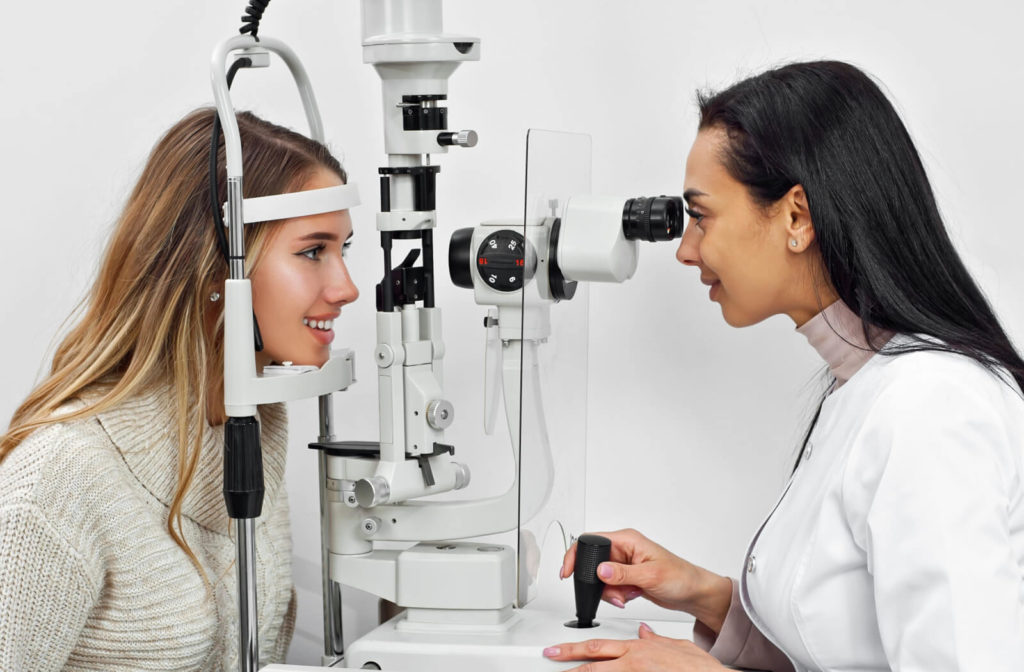Dry eyes can be a bothersome and uncomfortable condition. Dry eyes are characterized by symptoms such as irritated, gritty, scratchy, or burning eyes, a feeling of something in the eyes, excess watering, and blurred vision—dry eyes can cause blurry vision.
Many individuals suffering from dry eyes often wonder if their condition is responsible for their blurry vision. In this blog post, we will explore the connection between dry eyes and blurry vision, delving into the causes, effects, and potential treatments for this common issue.
Blurred Vision Is a Symptom of Dry Eyes
According to the American Optometric Association (AOA), people with dry eyes may experience blurred vision as one of the primary symptoms. Dry eye disease occurs when the eyes do not produce enough tears to keep them adequately lubricated.
As a result, the cornea, which is responsible for focusing light onto the lens, may not function optimally. The lack of tear film hampers the cornea’s ability to focus light correctly, leading to blurry vision.
Seek Treatment for Dry Eyes
While blurry vision may seem like a temporary inconvenience, it is essential to understand that untreated, dry eyes can potentially lead to permanent eye damage and vision loss. This emphasizes the importance of addressing the issue promptly and seeking appropriate treatment.
Eye Fatigue can Contribute to Blurry Vision
The relationship between dry eyes and blurry vision is multifaceted. Dry eye disease can cause eye fatigue, which further contributes to blurry vision. Eye fatigue occurs when the eyes are overworked and strained due to prolonged use, such as staring at digital screens for extended periods or engaging in visually demanding activities. The combination of dryness and fatigue can result in a blurred perception of objects.
Poor Tear Quality Is a Result of Dry Eyes
Additionally, dry eyes can lead to a decrease in tear quality. Tears act as a protective layer for the surface of the eyes, maintaining moisture and providing nourishment. When tears become insufficient or inadequate, the cornea can become prone to inflammation, abrasion, and even ulcers. These conditions can significantly impact vision, causing blurriness and discomfort.
There Are Many Causes of Dry Eye
The causes of dry eyes are diverse and can vary from lifestyle factors to underlying medical conditions. Medical News Today highlights that dry eyes may occur due to factors such as aging, hormonal changes, certain medications, environmental conditions (e.g., dry or windy climates), or prolonged contact lens wear. Therefore, it is crucial to identify and address the underlying cause of dry eyes to manage blurry vision and other related symptoms.
Watery Eyes Can Mean You Have Dry Eyes
It is worth noting that watery eyes can also be a symptom of dry eye disease. Paradoxically, excessive watering occurs when the tears evaporate too quickly, leading to inadequate lubrication and subsequent blurry vision. Wateriness can cause temporary blurriness until proper relief measures are taken to address the underlying dryness.
What Measures Can Alleviate Dry Eyes & Prevent Blurry Vision?
- Using artificial tears. Artificial tears are over-the-counter eye drops that can provide temporary relief by supplementing natural tear production.
- Practicing the 20-20-20 rule. This rule involves taking breaks every 20 minutes to look at an object 20 feet away for 20 seconds to help reduce eye strain.
- Adjusting the environment. Adding moisture to the air with a humidifier, avoiding fans or air conditioning directed toward the face, and wearing wraparound sunglasses can help minimize dryness.
- Maintaining good eyelid hygiene. Regularly cleaning the eyelids and lashes can prevent blockage of the oil glands, which contributes to tear film stability.
- Avoiding prolonged screen time. Limiting exposure to digital screens and taking frequent breaks can reduce eye strain.
If home remedies do not provide sufficient relief, it is best to consult an optometrist or ophthalmologist who can assess the severity of dry eye disease and recommend appropriate treatment options.
These may include prescription medications, anti-inflammatory eye drops, or specialized procedures aimed at improving tear production and retaining moisture in the eyes.

Treat Blurry Vision in Columbus
Dry eyes can cause your vision to blur. The lack of adequate tears can result in many issues that can affect your eye health, including corneal irregularities, eye fatigue, and decreased tear quality. These all contribute to your blurred perception of the world and can be very irritating and hard to deal with.
If you’re experiencing blurry vision or dry eye, please get in touch with our team at Pinnacle EyeCare for a comprehensive eye exam. Give us a call or schedule your appointment online today.






